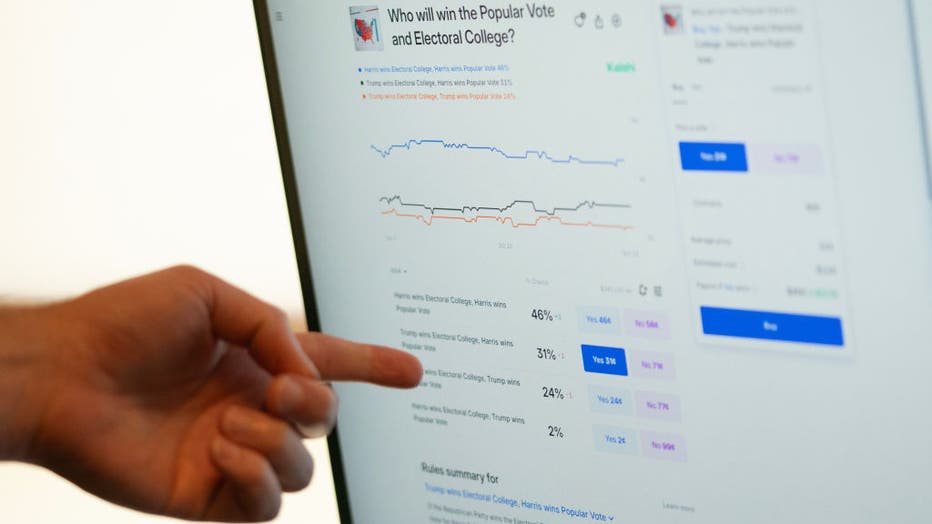Polymarket’s $2.7B Trump vs. Harris bets raise manipulation concerns
Less than a week remains until election day
Donald Trump is traveling to New Mexico and Virginia in the campaign’s final days, taking a risky detour from the seven battleground states to spend time in places where Republican presidential candidates have not won in decades.The former president will campaign in Albuquerque, New Mexico, on Thursday and Salem, Virginia, on Saturday. LiveNOW from FOX host Josh Breslow spoke to David Becker, Executive Director & Founder, Center for Election Innovation -and- Research on the latest.
LOS ANGELES - As Election Day approaches, the prediction market Polymarket has drawn attention with its $2.7 billion betting pool on the 2024 presidential race between Donald Trump and Kamala Harris. Currently, Polymarket’s odds show Trump with a 66% chance of victory.
However, a recent analysis from blockchain experts suggests nearly one-third of this activity may be due to wash trading, casting doubt on the platform’s reliability as a predictive tool.
Possible evidence of artificial trading on Polymarket
Blockchain research firms Chaos Labs and Inca Digital, known for digital market security and data analysis, recently reported findings that question Polymarket’s reported $2.7 billion in transaction volume. According to a Fortune report, the firms estimate actual volume at $1.75 billion, attributing the discrepancy to wash trading—a practice where the same party repeatedly buys and sells assets to inflate activity.
This artificial boost in volume, particularly in Trump’s favor, raises questions about whether the reported odds reflect genuine market sentiment or have been skewed by manipulation.
RELATED: Harris vs. Trump: Who's winning in the polls with 5 days to go?
What is Polymarket?
Polymarket is a decentralized prediction market platform where users bet on outcomes of events like elections, using blockchain technology for secure, anonymous transactions. Unlike traditional sportsbooks, Polymarket does not rely on a central intermediary, giving users the autonomy to place predictions directly on the platform.
The platform has gained additional visibility thanks to endorsements from high-profile individuals, including Elon Musk. Musk frequently tweets Polymarket’s betting odds on X (formerly Twitter), where he recently shared a link to the platform, saying, "It’s crazy how much people are betting on these predictions."
With Musk’s massive social media following, his tweets have amplified Polymarket’s reach and its perceived legitimacy.
Could betting markets influence the election outcome?
The popularity of election betting has raised concerns about potential impacts on voter perception and turnout. In theory, platforms like Kalshi and Polymarket reflect public sentiment through betting odds, but the alignment of those odds with traditional polling remains mixed. Kalshi, a legally regulated U.S. election betting platform, currently shows Trump with a similar advantage, while traditional polls indicate a tighter race.
NPR recently reported that Kalshi CEO Tarek Mansour has defended election betting as a way to offer regular citizens a chance to hedge against political risks, noting that federally regulated markets can deter manipulation.
During live coverage of former President Donald Trump’s rally at Madison Square Garden this past weekend, an election betting ad aired on Right Side Broadcasting Network, a conservative media outlet. The ad, promoting Kalshi’s election betting platform, appeared as Trump addressed the crowd, reading, "Bet on the US election. Bet $100 on Trump, Get $175."

Scott Owens points to his computer screen as he describes how to hedge a position for making a prediction on the U.S. Presidential Election at his home in Madison, Wisconsin on October 13, 2024. (Photo by Kayla Wolf for The Washington Post via Getty
Meanwhile, some experts argue that betting markets could influence election outcomes by shaping voter beliefs and enthusiasm.
RELATED: 2024 presidential election predictions: Here's what experts have said
Barnard College economics professor Rajiv Sethi, who studies prediction markets, told NPR, inflated odds for one candidate could impact factors like fundraising, volunteer efforts, and overall voter morale.
Sen. Jeff Merkley (D-Ore.) has recently voiced opposition, proposing legislation to ban election betting.
Merkley argues that betting on elections corrupts democratic processes, turning elections into financial markets rather than civic exercises. "Allowing election betting is a huge mistake," Merkley told NPR. "It corrupts our American elections by turning principles into pocketbooks."
The Source
This article draws from reports by the Associated Press, Fortune and NPR, with insights from blockchain research firms Chaos Labs and Inca Digital.

